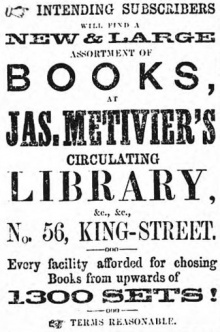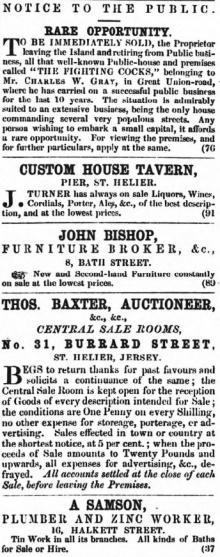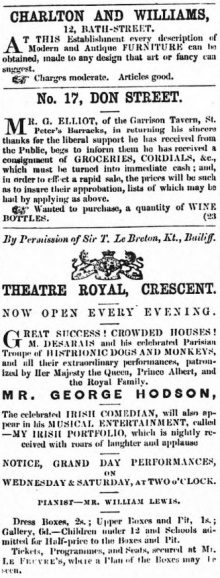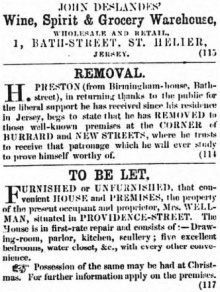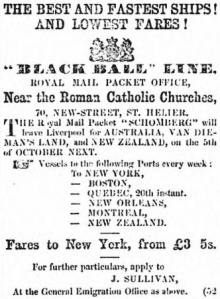|
On the political constitution of Jersey
As our object is not to prejudice, but rather to enlighten and rectify the opinions of those who may taken an interest in the matter under our immediate consideration, we wish to premise that the word 'Judge' as applied to the persons who, in this island, sit on the bench with the Bailiff, is a misnomer, a false and wrong appellation. They are not Judges; that is men versed in the knowledge of the laws, but assessors – men who were originally appointed to act as jurymen to assist the Bailiff in deciding cases submitted to his judgment. The late Rev Edward Durell, in one of his notes, expressly says: 'The words jurés (jurats) and justiciers are nearly now out of common use, for which that of Judges has been substituted. Anciently the word Judge was exclusively applied to the Bailly, in the English sense of the Judge and jury.' Sitting in Court as jurats to administer justice, the Jersey officials were evidently at most a judicial body only. It will naturally be asked, as a matter of course, how, being a judicial body, they ever could lay any claim to legislation? The reason is obvious. Holding in their hands the power of punishment or pardon, they managed matters how they pleased; and uncontrolled, through the want of a proper surveillance by the higher powers, they, by degrees, assumed the authority of issuing laws and ordinances, and of levying taxes on the people, who, then wretchedly poor, penurious and unlettered; and moreover, totally unacquainted with even the very essential principles upon which constitutional or representative governments exist, tacitly submitted themselves to the usurped and arbitrary power of their rulers. [1] ------------------
Court case delayed
for 36 years The respondents and those who they represent being in possession of all Philip de Carteret's immoveable and movable estates, have by their wilful and artful delays kept their plain action of dower on foot for 36 years and upwards. Although the right of such dower was never denied, and among other means of delay (sanctioned by the Court) it was the usual practice for three of the four co-heirs to appear from time to time while the fourth made a default, and stood out till the last process. By compulsion the fourth co-heir was obliged to appear; then one of the other three co-heirs who had appeared before, made default and stood out the like process, and so in succession, each of the two other co-heirs, to the unprecedented delay of justice and the Petitioner's suit, which could not, by the course followed in the Jersey Court, proceed till all the respondents jointly appeared. We had heard of the delays of the Chancery Court, but they dwindle into insignificance before those of the Court Royal. Only think of parties playing the vulgar game of Hide and go Seek for the space of 36 years, and the Court enjoying the fun, and pocketing the expenses. ------------------
Unfairness in
newspaper delivery We regret to have to complain of the monopoly which exists in the delivery of newspapers in the Post Office of this island, which is highly detrimental to the public interest, especially at the present time, when the latest news are so anxiously sought after. An early delivery of newspapers takes place about half an hour after the arrival of the mail steamer to the Clubs and other places who were fortunate enough to have the privilege granted them years ago. Any person now establishing a Public Newsroom and wishing to be placed on the same footing, is told that the privilege cannot be extended, but he must wait for his newspapers an hour and a quarter after the arrival of the mail. The reason given for this Post Office monopoly is as ridiculous as it is arbitrary; as if the fact of not having applied for the privilege at the same time as those who now enjoy it was a cause why it should not be granted now. What we contend for is not that all newspapers should be delivered at the present early delivery, but that there should be no exclusiveness, as exists at present. |
THE STATES
Debate on extra
representation finally starts Tuesday 21 September 1855
The Rev Mr Guille, Rector of St Mary's, brought forward the motion previously submitted to the Assembly, viz: that of enlarging the representation of the States. The Constable of St Helier's urged the necessity of increasing the members of their Assembly. He thought some of our institutions needed reform, the first of which was that of the States themselves. They no longer answer the purposes for which that body was called in existence, and therefore he should propose that 14 additional members be added to those now existing. The Contable of St Saviour's seeks to exonerate himself from the charges brought against him for having placed obstacles in the way of the bill now under consideration, and throws the whole onus of that delay on the members of the Committee to which it had been referred, one of whom was the Constable of St Helier's. Judge Picot speaks in favour of Reform, and observes that in reference to the admittance of new representatives in the States, he had heard no one speak against that measure. The increasing of the number of representative will have the effect, he hopes, not only of amending the laws on bankruptcy and Decrets but of reducing the public debt. Judge Nicolle would admit of the principle, but would confine it to four members taken from the Police, who should fill some municipal functions. (Murmurs of dissatisfaction.) Draught Bill considered
The Constable of St Saviour's, after a long rambling account of the effects which the bill now pending would produce on the Assembly, acknowledges that he was fully aware that our institutions were very far from being perfect, and that as far as he was personally concerned, he would rather have a purely representative assembly altogether than that which now exists. Why, what are we here, he exclaimed, but an assembly of public functionaries? He would rather see Judges, Rectors and Constables out of the house yield their places to others exonerated from municipal offices, and he would moot that question if he knew that it would be palatable to the States, or the public at large, which he very much doubted. The Bill of 16 August, which declared that the new representatives should have some municipal functions to fulfil, having been put to the vote, was rejected by a majority of six votes. This decision was received by the public with loud cheers. Judge Le Gallais, to everyone's surprise, returned to the charge and insisted that the new members should be municipal officers. This was objected to and finally rejected by a majority of four votes. 'Institutions far from perfect'
The following draught of a new Bill was then discussed: 1 - Some members shall be added to the States. They will sit after the Constables. They shall enjoyh the same rights and fulfil the same duties as the other members, and be allowed to form part of the committee of the States. 2 - The parish of St Helier will select three members, the other parishes one member each. On this article the Constable of St Saviour's proposed an amendment purporting that 'The said members should be taken from the parish in which they reside, or are assessed.' This amendment was vigorously opposed but ultimately carried by a majority of two votes. 3 - The selection of said members shall take place every three years on the second Tuesday in the month of January. The Royal Court will order the said election and appoint a Jurat, or other functionary to preside at the poll and collect the votes. This draft of a Bill was then adopted and referred to a Committee, which is to bring it up in a regular form before the States at a future sitting. ------------------
COURT OF CORRECTIONAL POLICE
Monday 17 September 1855
Before Mr Judge Le Gallais
Bought boots at Fort
A French lad named Auguste Baptiste was charged with having, on Friday last, gone to Fort Regent and purchased, from several soldiers of the 65th depot, seven pairs of military boots. He was apprehended by the Sergeant of the guard on going out of the Fort with the boots in a bag, and afterwards delivered into the hands of the police. He was sentenced to pay a fine of 10 shillings or to go to prison for four days. ------------------
Hard labour for prostitutes
Charlotte Davis, Charlotte Waters and Rachel Moore, three well-known prostitutes, were brought up, charged with creating a disturbance about midnignt on Monday in Mulcaster Street, being then in a state of intoxication. The Judge, after hearing the witnesses, sentenced the prisoners as follows: Charlotte Davis, in consequence of her previous bad antecedents, to 8 days imprisonment, with hard labour; and Charlotte Waters and Rachel Moore to three days of the same punishment. ------------------
Jail for scrumping
Mary Ann Phillip and Mary Ann Taylor were brought up for having stolen an apronful of apples from an orchard belonging to Mr Samuel Le Feuvre of Mont a l'Abbé. The judge sent the prisoners to jail for 24 hours. |
Turnkey McCormick dies
Mr W F McCormick, one of the Turnkeys of Her Majesty's public jail in this island, died this week at the age of 55 years. ------------------
Pensioners inspected
His Excellency the Lieut-Governor inspected the corps of Pensioners on Fort Regent Wednesday morning last, and paid the gallant band a due tribute of praise for their fine and cleanly appearance, and the admirable precision with which they went through a series of evolutions. ------------------
Confusion over name of wrecked ship
It is currently reported that a vessel, the mastheads of which are seen above water, lies stranded in the north of the island, near a ledge of rocks known as the Pierres de Lecq. Some suppose it to have been a French Chassemarée which, driven by the strong impulse of the tides and eddies, has lost its way and sunk where it now lies. Another inquest was held on Thursday at Bonne Nuit on the body of another sailor who was cast ashore near Fremont Point. It is supposed to be the body of one of the crew belonging to that French vessel mentoned above, which lies about the Pierres de Lecq, which vessel there is every reason to suppose is the Louisa from Vannes. ------------------
Local midshipmen
We are informed that several young gentlemen of this island have been engaged as midshipmen in some of the most extensive firms of ship owners of the ports of London and Liverpool. The berths are very advantageous; they lead to good and lucrative appointments as officers in our East Indiamen and other first-class ships. These nominations have been obtained through Mr John Sullivan, of New Street. ------------------
Sad accident
A sad accident befel a person called Perriman on Thursday morning, while unloading the brig Constant, then lying in Albert Pier. Engaged in the hold of the vessel, Perriman was in a stooping position when suddenly a part of the tackle by which the coals were conveyed out of the vessel gave way, and fell on one of his shoulders, which it dislocated. The poor man was taken to the hospital, where every attention was immediately given him. ------------------
Coroner's inquest
A Coroner's inquest was held on Monday afternoon in St Ouen's parish, on the body of a man dressed in the garb of a French sailor, that had been washed ashore in that parish. The right leg was fractured above the ankle and such was the state of decomposition in which the body was found that it is supposed to have been some eight or ten days in the sea. ------------------
Death of Dr Nicolle
We regret to have to record the lamentable dath of Dr Nicolle snr of St Martin's Parish in this island, an ancient and able practitioner of the old school. It appears that the Doctor, accomapnied by his daughter and friend, a lady, was about to proceed to Guernsey, whether on business or pleasure bent is not ascertained; some say for the benefit of his health, which had been declining; when arriving near the Pierhead and nigh unto the flight of steps that lead into the harbor, he perceived the Packet had just left. This, it is said, affected him to that degree that he bowed down his head, and immediately breathed his last. A cab having been obtained conveyed the deceased gentleman to his residence where, among his sorrowful friends whom but a short time before, had left him in comparative good health, and inquest was held in the afternoon when the following verdict was returned 'Died of disease of the heart'. Dr Nicolle was one of the wealthiest men of his parish, and well known as a warm partisan of the Rose party, for many years in the ascendant among the faction contending for political power in the island. |
_____________
_____________
_____________
_____________
|
Notes and references
- ↑ The editorial comment then drifted into a highly critical analysis of the events of the late 16th century which culminated in a Royal Commission investigating complaints of a 'corrupt Court and administration'.



